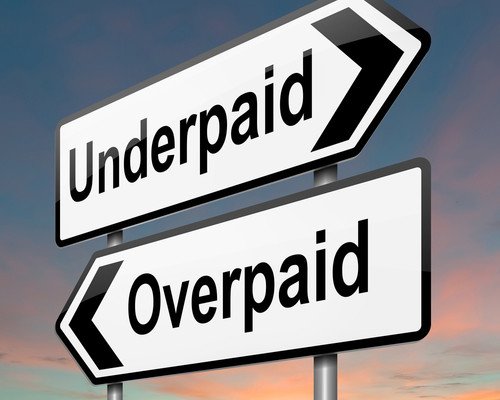Dealing with Underpayment and Overpayment in Business
In a business, when it comes to paying staffs, the goal is not to overpay, and ovoid underpayment to employees. The both situations aren’t good in business at all as some companies that underpay tend to struggle in the long run due to high employee turnover while a few others utilizes it properly but most times their employees won’t be willing to work. On the other hand, companies in an industry that pays their employees well tend to be more profitable and at the same time, a few tend to still struggle. It is very difficult to say that paying higher wages improve productivity just as it can’t be proven that paying very low wages will guarantee productivity.

Source: peoplehr.com
One thing you need to understand with employees is that never pay lower than their current cost of living needs, it could be higher or equal but paying an employee below the cost-of-living making them to adjust their standard of living will often lead to an ask for an increase in salary based on their needs. When I mean paying them what is enough for their cost-of-living, I did not mean knowing the exact amount the employee chooses to spend, as the amount they choose to spend in their lives is not your problem rather, you should be able to pay within the market-based range for their roles or the minimum salary or wage set by the market. In essence, salary payment should be something that the employee can adjust their cost of living to.

Salary is like a fuel to the employee, it is used to push life activities when consumed. So, it is not a must the salaries of workers be overpaid so as to meet the needs of the employees rather, the employees should be able to adjust the cost of leaving reasonably either up or down without having to worry about a raise/increase in pay for their services.
Dealing with Underpayment and Overpayment
In paying salaries or wage to employee, it is important to leverage payment based on what the employees know and if they have the capacity to produce instead of on the basis of years experiences in doing such job, a lot of people have long term years of experience in a position but the year experiences might just be worth 6 months of actual experience as they aren’t productive.
In an organization, if a lower paid employee delivers at the level of a higher paid employee and there is a higher paid employee who represents the true-bas the market value, it is advisable that the lower paid employee get a raise in salary. On the other hand, if a lower paid employee deliver a higher paid work and a higher paid employee isn’t representing or delivering based on the status, two things can be done. The higher paid staff can be transitioned out of the business or be lectured and helped to improve performance or in some cases pay can be lowered for underperformance.
Evaluation of Employees for Profitability
In other to ascertain if an employee is doing well and worth the salary being offered or paid, a few things are to be considered;
- How productive is the employee
- Relationship with other employees and team spirit
- Relationship with customers (How they represent the business to customers)
- Contribution of the employee to targeted profitability level of the business
- Improvement in skills and responsibility of the employee
With this, it is easy to ascertain an underpaid or overpaid employee in a business. Most often, it is good to help overpaid employee improve so they can be productive and in rare case, letting them out of the business is good for the business as well.

Resteemed already :) Upvote on the way
I have witness cases of undervalued employees being paid very high amount of money while the overvalued ones are left with stipends. It is good to read this post, thanks for reading.
There certainly should be a difference in payment for workers who are hard working and for those who are not as hard working as others, possibly the less hardworking ones will get geared up to work.
Greetings friend @ben-edom.
Excellent selection of theme.
There should be a balance between levels of wages and productivity. But there are many factors involved
Mainly the employer must focus on the comfort levels of his workers, for this he can implement several procedures that, although they do not represent salary payments, they do represent an expense for the organization.
I mean "stimuli" for production, health bonuses, dental or maternity insurance policies. These factors have a positive impact on the availability of workers and increase productivity. Many times it is convenient for the administration of the company since this type of benefits does not impact the generation of labor liabilities.
It is also interesting to establish salary tables. With the salary tables you can take the factors seniority + level of education for the allocation of salaries. This results in favorable levels of equity that promote a better work environment and therefore should favor production levels.
Great article.
Your friend, Juan.
Workers can be very difficult to handle. At some point a worker can look like the best thing that the company ever wanted but as time goes, if they do not improve on their skills and knowledge, they soon become undervalued.